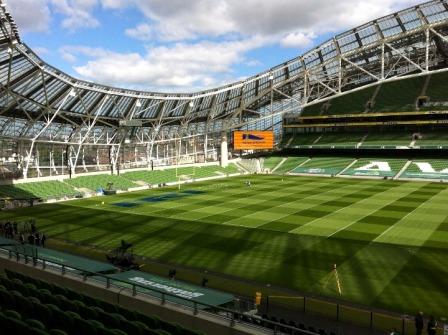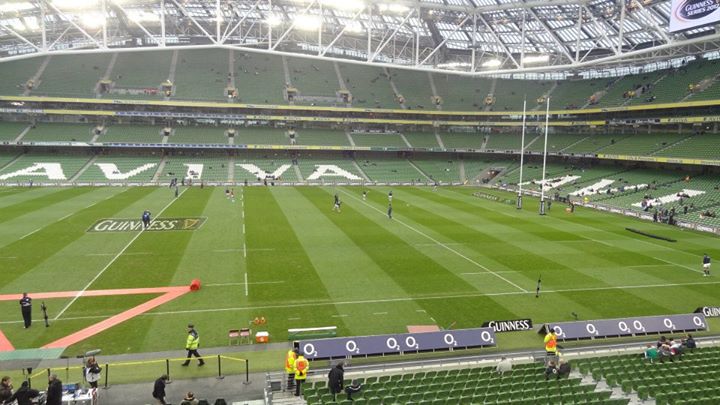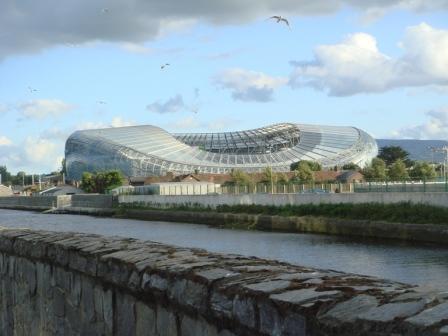Ireland - Aviva Stadium
Image - Owen Pavey
The
Irish Rugby Football Union was founded in 1879 to manage all aspects of
the game in Ireland, joining the IRB as a founder member in 1886.
Unlike with soccer, the Irish national side represents both Northern
Ireland and Republic of Ireland as one team. The senior side play their
home fixtures at the Aviva Stadium in the South of Dublin, which in
2010 replaced the home of Irish rugby since 1878 - Lansdowne Road.
Ireland have competed in 112 of the Four/Five/Six Nations tournaments,
winning on 11 occasions and sharing the title eight times. Their most
recent success came in the 2009 tournament when the Irish took the
Grand Slam after a memorable final-day win over Wales in
Cardiff.
Ground Information Back to Top ^
The Aviva Stadium is situated on the site of the old Lansdowne Road ground, which served Irish rugby well for over a hundred years before being demolished in 2007. The current name is the result of a 10-year sponsorship deal with an insurance firm. The ground is located around 3km from the City Centre in the Southeastern suburb of Ballsbridge.

The stadium has a rather unusual modern design, with a transparent curved roof allowing light through to local residents as well as providing spectators with shelter from the wind and rain. The close proximity of housing has also led to a single-tiered North Stand, and the resultant reduced capacity often draws criticism - the Aviva Stadium has by far the smallest capacity of the Six Nations grounds at 51,700, despite Ireland drawing crowds of 80,000 at their temporary home of Croke Park (home of the Gaelic Athletic Association) during the rebuild.
The other three sides of the ground have three tiers of covered seating, with the top and bottom tiers for general ticketholders and the middle tier providing 10,000 premium seats, with added luxuries such as padded seats for those who have forked out for access to this section of the stadium.
Nevertheless, the Aviva is a comfortable, modern ground and getting in and out of the ground is well managed.

Getting There Back to Top ^
The car isn't really an option at the Aviva - an exclusion zone is in operation around the ground on matchdays and there is no parking available, so walk from the city centre (3km) if you're feeling fit or take one of the following public transport options.
By Rail
The suburban railway in Dublin is known as the DART, and has a station at the ground known as Lansdowne Road, whilst Grand Canal Dock station also serves the ground. Direct services operate from Connolly Station, Tara Street and Pearse Station. You can view a map of the DART network here.
The light rail system LUAS's Green line runs from St Stephen's Green to Charlemont, which is a short walk from the Aviva Stadium. You can pick up a ticket at the station before boarding. You can view a map of the LUAS network here.
By Bus
Dublin Bus operate a range of services to the area around the ground. Bus routes 4, 5, 7, 8, 18, 45 and 63 stop at Pembroke Road close to the ground, whilst routes 2, 3, 50, 56 and 77 stop at Charlotte Quay nearby.
By Air
Dublin Airport is 11km North of Dublin City, and 15km from the RDS.
Regular flights operate to a wide range of destinations, including
Aberdeen, Birmingham, Blackpool, Bournemouth, Bristol, Cardiff, East
Midlands, Edinburgh, Exeter, Glasgow (International and Prestwick),
Leeds/Bradford, London (City, Gatwick, Heathrow, Luton and Southend),
Lyon, Manchester, Milan (Linate and Malpensa), Nantes, Newcastle, Nice,
Paris (Beauvais and CDG), Rome (Ciampino and Fiumicino), Southampton,
Venice (Marco Polo) and Verona.
A taxi will cost around 25 Euros to the City Centre. Alternatively, bus
services operate from the Airport to the City Centre.
- Aircoach services depart every 15 minutes and operate to a range of destinations across Dublin, include the suburbs close to the ground if you are staying in the South Dublin area.
- Dublin Bus offer the cheapest (but slowest) connections to the CIty Centre on the 16A bus, and also operate an Airport Express service.
By Ferry
There are two ports in
the Dublin area that receive passenger services.
Dublin Port
Stena
Line ferry services run from Holyhead in North Wales to
Dublin, taking just over 3 hours. Irish Ferries also operate on this
route, taking between 2 hours and just over 3 hours depending on the
service chosen. Bus connections to the City Centre are operated by
Dublin Bus and take around 30 minutes.
Dún Laoghaire
Port
Stena
Line ferry services run from Holyhead to Dún Laoghaire,
taking around 2 hours. From Dún Laoghaire, you can take the DART
suburban railway to Dublin or mainline rail services. Buses also
operate from Dún Laoghaire to Dublin. It is also the handier port for
the stadium itself, as it is located to the South of the city.

The Smaller North Stand
Drinking Back to Top ^
Unsurprisingly Dublin is not a bad place for a tipple, with plenty more than Guinness on offer. The good people at Leinsterfans.com have created a comprehensive guide to the top bars and hotels in the area around the Aviva Stadium that can be viewed here.
Eating Back to Top ^

Sleeping Back to Top ^
From luxury hotels to dirt-cheap hostels, Dublin caters for every type of visitor so simply search online. The majority of first-time visitors stay in the City Centre close to the action, although if you want a more relaxed stay and to be close to the popular restaurants and bars of South Dublin (and the Aviva Stadium), you could consider staying in the Ballsbridge / Donnybrook area - check out the map here for recommendations from the guys at Leinsterfans.com
Make a Trip of It Back to Top ^
Dublin is one of the most popular tourist destinations in the world, famous for its nightlife, history and a list of attractions too numerous to include here. Whether you are into fine dining, exploring history or a night on the tiles, Dublin should fit the bill. Wikitravel offers a pretty extensive guide.Key Information
- Capacity
51,700 - Address
Aviva Stadium
62 Lansdowne Road
Dublin 4 - Website
www.irishrugby.ie
Disabled Supporters
- Accessibility at the Aviva was designed-in - there is
access to all floors within the stadium via a series of lifts, and
viewing positions for wheelchair users in all areas, mostly at the rear
of the seating blocks. There is also tactile flooring and signage in
and around the stadium, and commentary services available.
- However, there is only limited disabled parking available
at the ground, which if required should be booked in advance.
Quarter-Final Specialists
- The Irish have been present at every World Cup so far, but
have not yet managed to get beyond the Quarter-Final phase, where they
have been knocked-out in 5 of the 7 tournaments to date.
Dublin's Rugby Heartland
- This is real rugby territory in the Irish capital, with the
RDS Arena, home of provincial side Leinster close by. For high-profile
home fixtures, Leinster often opt to switch fixtures to the larger
Aviva Stadium, which also hosted the 2013 Heineken Cup final.
Find Your Way
- NOTE: The Aviva has a colour-coded system of entry points
to help with the flow of spectators. Your best best is to check which
colour is indicated on your ticket and follow the official instructions
here.
Add Your Information
- Got something to add? Spotted a mistake? The Rugby Ground
Guide is dependent on your input to make it work
- You can submit information or images here.

